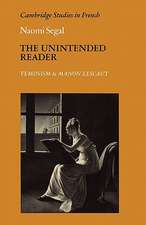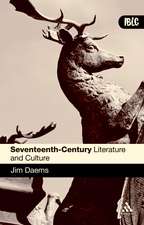Shakespeare and Impure Aesthetics
Autor Hugh Gradyen Limba Engleză Paperback – 18 apr 2012
Preț: 348.47 lei
Nou
Puncte Express: 523
Preț estimativ în valută:
66.70€ • 72.48$ • 56.06£
66.70€ • 72.48$ • 56.06£
Carte tipărită la comandă
Livrare economică 21 aprilie-05 mai
Preluare comenzi: 021 569.72.76
Specificații
ISBN-13: 9781107404205
ISBN-10: 1107404207
Pagini: 272
Dimensiuni: 152 x 229 x 16 mm
Greutate: 0.4 kg
Editura: Cambridge University Press
Colecția Cambridge University Press
Locul publicării:New York, United States
ISBN-10: 1107404207
Pagini: 272
Dimensiuni: 152 x 229 x 16 mm
Greutate: 0.4 kg
Editura: Cambridge University Press
Colecția Cambridge University Press
Locul publicării:New York, United States
Cuprins
Acknowledgements; 1. Introduction: impure aesthetics; Part I. A Shakespearean Aesthetic: Into the Woods outside Athens: 2. A Midsummer Night's Dream - eros and the aesthetic; 3. Modernity, usury, and art in Timon of Athens; Part II. The Aesthetics of Death and Mourning: 4. Hamlet as mourning play; 5. Beautiful death in Romeo and Juliet; Conclusion: the critical present; Bibliography; Index.
Recenzii
"Grady offers a timely corrective to those who continue to view the aesthetic as an outmoded and idealized category – a straw target that was ritually bowled over in the first wave of cultural theory. Instead, he offers ‘impure aesthetics’ as a ‘place-holder’ for that which is ‘repressed elsewhere in the system’. In the process he repositions the aesthetic as a dynamic and critical concept – one that post-dates Shakespeare’s plays but continues to prove crucially informative in our reinterpretation of the playwright’s work."
-Professor John J. Joughin, University of Central Lancashire
"...Grady continues his important project of investigating the formation of modern subjectivity in Shakespeare. This time it is in relation to aesthetics - a subject...Recommended"
-A.DiMatteo, New York Institute of Technology
-Professor John J. Joughin, University of Central Lancashire
"...Grady continues his important project of investigating the formation of modern subjectivity in Shakespeare. This time it is in relation to aesthetics - a subject...Recommended"
-A.DiMatteo, New York Institute of Technology
Descriere
This book examines Shakespeare's plays and defines specific Shakespearean aesthetic practices in his use of desire, death and mourning.


















